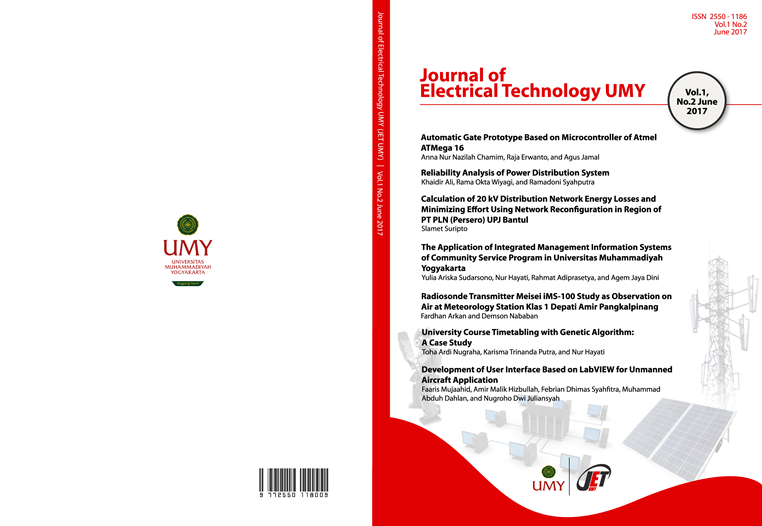University Course Timetabling with Genetic Algorithm: A Case Study
DOI:
https://doi.org/10.18196/jet.1213Keywords:
University Course Timetabling Problems, Genetic Algorithm, SchedulingAbstract
University Course Timetabling Problems is a scheduling problem to allocate some lectures with some constraint, such as the availability of lecturers, number of classrooms and time slot in each day. The schedule of courses is one of important factors before start the semester in order to manage the study process. Generally, the university course scheduling in some universities are usually created manually through administration office. It needs to synchronize for all schedules from all departments in faculty of the university. In addition, the limitations of classroom and timeslot can make collision of the courses, lecturers and also incompatibility between the room capacity and the number of students whom take the course in the class. This paper proposes the university course time tabling systems. Based on some simulations with 93 courses, 18 lecturers and up to six classrooms, the result is that the system will get the best violation if the system adds more number of iteration. This situation also happens in the result of the scheduling lectures, the system will get the best percentage when the number of iteration sets as maximum.References
Shengxiang Yang, Sadaf Naseem Jat, Genetic Algorithms With Guided and Local Search Strategies for University Course Timetabling, IEEE Transactions on Systems, Man, and Cybernetics, Part C (Applications and Reviews) ( Volume: 41, Issue: 1, Jan. 2011 ), pp. 93 - 106.
R. Qu, E. K. Burke, B. McCollum, and L. T. G. Merlot “A survey of search methodologies and automated system development for examination timetabling,” J. Sched., vol. 12, no. 1, pp. 55–89, 2009
Suyanto, An Informed Genetic Algorithm for University Course and Student Timetabling Problems, 2010, ICAICS, Springer Verlag, pp. 229-236
Jaya Pandey, A K Sharma, 2016, Survey on University Timetabling, Computing for Sustainable Global Development (INDIACom), 2016 3rd International Conference on, 16-18 March 2016, New Delhi, India, pp. 160-164
A. SCHAERF, A Survey of Automated Timetabling, Artificial Intelligence Review 13: 87–127, 1999. Netherlands.
Hamdy M. Mousa, Ashraf B. El-Sisi, Design and implementation of course timetabling system based on genetic algorithm, Computer Engineering & Systems (ICCES), 2013 8th International Conference on, 26-28 Nov. 2013, Cairo, Egypt.
Shara S. A. Alves, Saulo A. F. Oliveira, Ajalmar R. Rocha Neto, A Novel Educational Timetabling Solution through Recursive Genetic Algorithms, Computational Intelligence (LA-CCI), 2015 Latin America Congress on, 13-16 Oct. 2015, Curitiba, Brazil.
Amir Hossein Karami, Maryam Hasanzadeh, University Course Timetabling Using a New Hybrid Genetic Algorithm, Computer and Knowledge Engineering (ICCKE), 2012 2nd International eConference on, 18-19 Oct. 2012, Mashhad, Iran.
Ho Sheau Fen Irene, Deris Safaai, Mohd Hashim Siti Zaiton , University Course Timetable Planning using Hybrid Particle Swarm Optimization,GEC’09, June 12–14, 2009, Shanghai, China. pp. 239-245.
Ho Sheau Fen Irene, Deris Safaai, Mohd Hashim Siti Zaiton , A Study on PSO-based University Course Timetabling Problem, dvanced Computer Control, 2009. ICACC '09. International Conference on, 22-24 Jan. 2009, Singapore, Singapore. pp. 648-651.
Ruey-Maw Chen and Hsiao-Fang Shih, Solving University Course Timetabling Problems Using Constriction Particle Swarm Optimization with Local Search, Algorithms 2013, 6, 227-244.
Downloads
Published
How to Cite
Issue
Section
License
Copyright
The Authors submitting a manuscript do so on the understanding that if accepted for publication, copyright of the article shall be assigned to Journal of Electrical Technology UMY. Copyright encompasses rights to reproduce and deliver the article in all form and media, including reprints, photographs, microfilms, and any other similar reproductions, as well as translations.
Authors should sign Copyright Transfer Agreement when they have approved the final proofs sent by the journal prior the publication. JET UMY strives to ensure that no errors occur in the articles that have been published, both data errors and statements in the article.
JET UMY keep the rights to articles that have been published. Authors are permitted to disseminate published article by sharing the link of JET UMY website. Authors are allowed to use their works for any purposes deemed necessary without written permission from JET UMY with an acknowledgement of initial publication in this journal.
License
All articles published in JET UMY are licensed under a Creative Commons Attribution-ShareAlike 4.0 International (CC BY-SA) license. You are free to:
- Share — copy and redistribute the material in any medium or format
- Adapt — remix, transform, and build upon the material for any purpose, even commercially.
The licensor cannot revoke these freedoms as long as you follow the license terms. Under the following terms:
- Attribution — You must give appropriate credit, provide a link to the license, and indicate if changes were made. You may do so in any reasonable manner, but not in any way that suggests the licensor endorses you or your use.
- ShareAlike — If you remix, transform, or build upon the material, you must distribute your contributions under the same license as the original.
- No additional restrictions — You may not apply legal terms or technological measures that legally restrict others from doing anything the license permits.







